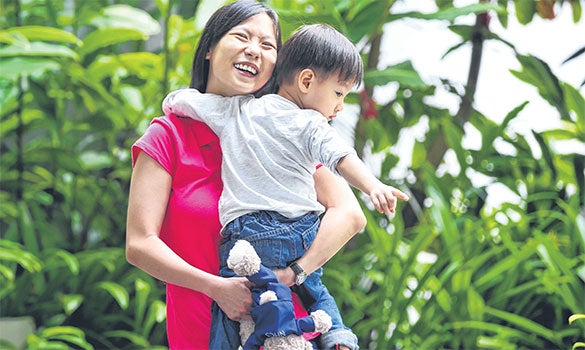
She
benefited from
SGH’s joint clinic
scheme when
she was
expecting her
first child three
years ago. Ms
Tan, who was
born with two
holes in her
heart, had a
difficult
pregnancy.
Supervision by
doctors from the
cardiology
joint-clinic
enabled her to
deliver a healthy
boy at 26 weeks.
More women going through highrisk pregnancies have been receiving care at the Singapore General Hospital (SGH), thanks to its four joint clinics that treat diseases such as diabetes and heart conditions.
The hospital has helped women save time by letting them see doctors from the obstetrics and gynaecology and diabetes departments in the same consultation, instead of having to make separate visits. This was started in 1995.
Over the years, the hospital expanded the joint clinics to the cardiology, rheumatology and haematology departments, said Associate Professor Tan Hak Koon, who heads SGH’s obstetrics and gynaecology department. The rheumatology joint clinic was added in 2015 and the haematology joint clinic last year. These led partly to higher figures released on Monday, which show that the number of patients at the joint clinics rose by half from 280 in 2013 to 420 last year.
The hospital sees 2,800 pregnancies a year on average. While the number of babies born at SGH was a fraction of the total of 39,615 births last year, the hospital helps to handle cardiology and rheumatology cases referred by other maternity hospitals here.
Diabetes remains the most common condition seen at the joint clinics, with more than one-fifth of pregnant women seeking help for it last year, followed by cardiac conditions which one-tenth of the women suffered from.
A subsidised joint consultation costs $78, which is double the cost of a consultation with one doctor. Other maternity hospitals here have their own set-up to treat highrisk pregnancy cases.
KK Women’s and Children’s Hospital runs obstetric clinics for highrisk pregnancies, where patients are managed by a team of specialists.
The hospital sees an average of 11,500 babies delivered each year. At the National University Hospital, which handles an average of 4,200 pregnancies each year, its obstetrics and gynaecology department has three types of clinics to manage high-risk pregnancy cases.
Clerk Winnie Tan, 31, benefited from SGH’s joint clinic scheme when she was expecting her first child three years ago.
Ms Tan, born with two holes in her heart, was told she had an 80 per cent risk of miscarriage. “I was getting too breathless and couldn’t walk 16 weeks into my pregnancy and had to be admitted to the hospital.”
But supervision from the cardiology joint-clinic doctors enabled her to deliver a healthy boy at 26 weeks.
Contributed by














 Get it on Google Play
Get it on Google Play